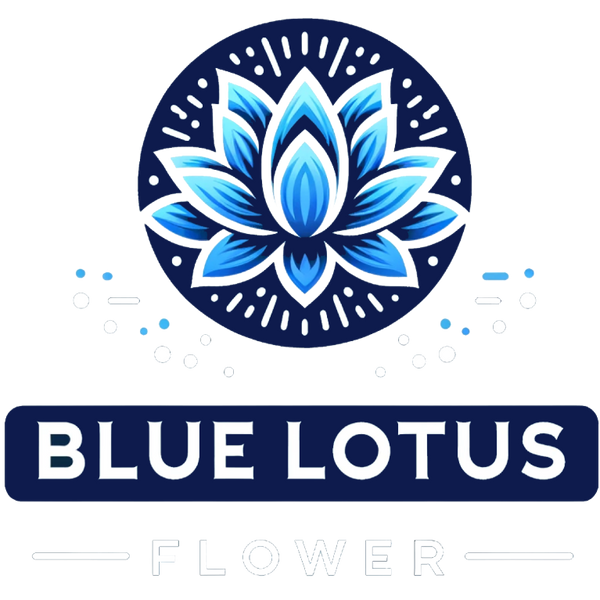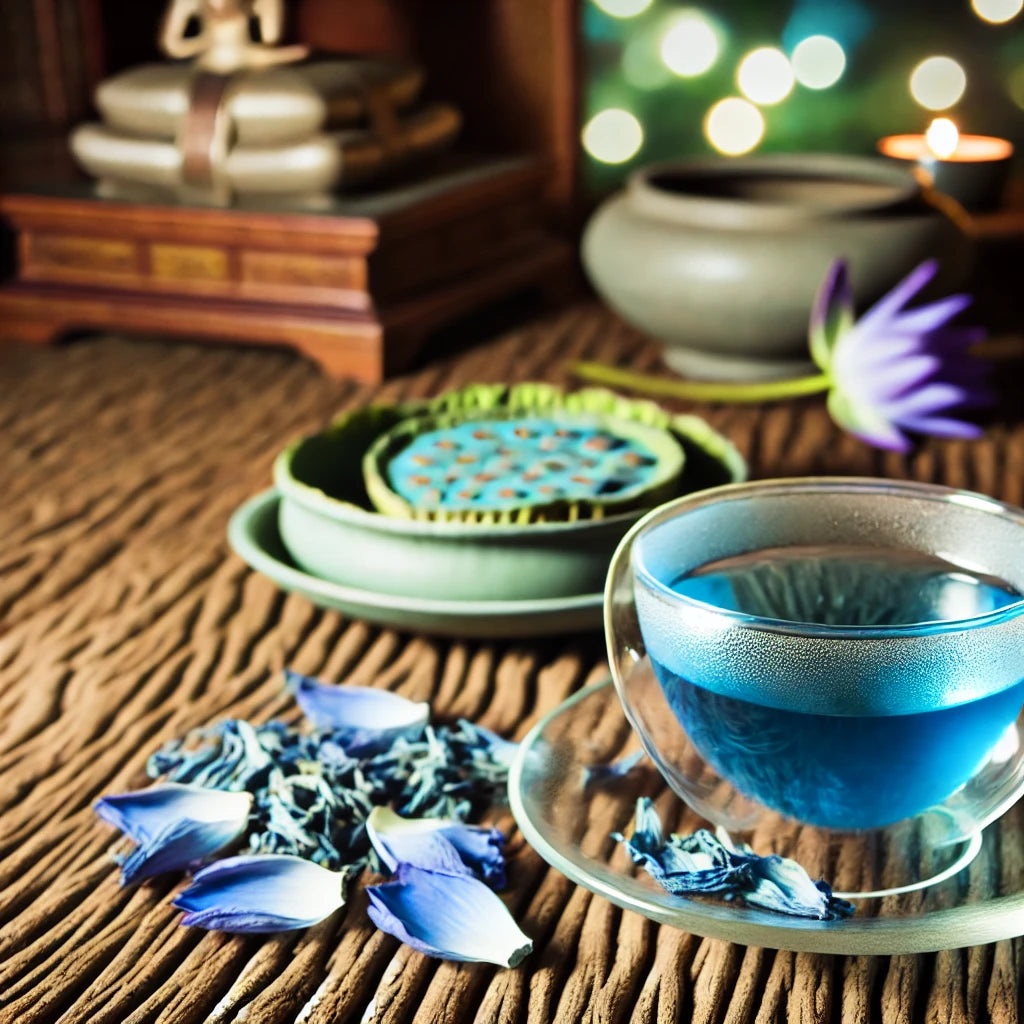Blue Lotus Tea, derived from the sacred blue lily, has captured the attention of herbal enthusiasts and wellness seekers alike. Known for its psychoactive effects and medicinal properties, this ancient elixir has a rich history that dates back thousands of years, particularly in ancient Egypt. This article will explore the origins, preparation methods, psychoactive effects, medicinal uses, and the overall benefits of consuming Blue Lotus Tea.
What is Blue Lotus Tea and How is it Made?
What are the Origins of Blue Lotus Flower Tea?
The origins of Blue Lotus Tea can be traced back to ancient Egypt, where the blue lotus flower, or Nymphaea caerulea, was revered for its beauty and psychoactive properties. The blue lily flower was considered sacred and was often associated with various deities and spiritual practices. Ancient Egyptians used the blue lotus for its calming effects and as a symbol of rebirth and enlightenment. As a result, the flower became an integral part of cultural rituals and medicinal practices. Today, the blue lotus flower continues to be celebrated worldwide for its aromatic qualities and health benefits.
How to Brew Blue Lotus Tea?
Brewing Blue Lotus Tea is a simple process that allows the flavorful and psychoactive properties of the blue lotus flower to be extracted effectively. To brew blue lotus tea, start by using dried blue lotus flowers, which can be purchased from herbal shops or online. Begin by boiling water and then allowing it to cool slightly to around 190°F (88°C). Add approximately one tablespoon of dried blue lotus flower to a teapot or infuser. Pour the hot water over the flowers and let them steep for about 10 to 15 minutes. The longer the flowers steep, the stronger the flavor and psychoactive effects will be. Finally, strain the tea and enjoy it warm or chilled, based on your preference.
What Ingredients are Needed to Make Blue Lotus Tea?
To make blue lotus tea, the primary ingredient is, of course, the dried blue lotus flowers. While you can enjoy the tea on its own, many enthusiasts like to enhance its flavor and benefits by adding other ingredients. Common additions include honey for sweetness, lemon for a citrusy kick, or even complementary herbs such as chamomile or peppermint. These ingredients can help amplify the soothing qualities of the blue lotus flower, creating an enjoyable and aromatic flower tea experience.
What are the Psychoactive Effects of Blue Lotus?
How Does Blue Lotus Induce Relaxation?
The blue lotus flower is known for its mild psychoactive effects, which can induce a state of relaxation and tranquility. When consumed, the compounds present in the flower, such as nuciferine and apomorphine, interact with the brain's receptors, promoting a sense of calm and well-being. Many users report experiencing reduced anxiety levels and an overall sense of peace after consuming blue lotus tea. This relaxation effect makes blue lotus an excellent choice for individuals seeking stress relief or a natural method to unwind after a long day.
What are the Psychoactive Compounds in Blue Lotus?
The psychoactive properties of the blue lotus flower are primarily attributed to its unique chemical composition. The flower contains several compounds, including nuciferine and apomorphine, which are known for their psychoactive effects. Nuciferine, in particular, is of interest due to its potential to enhance mood and induce relaxation. These compounds work synergistically to provide a mild euphoric sensation, making blue lotus tea a popular choice for those interested in herbal remedies with psychoactive effects.
Are There Any Risks Associated with Psychoactive Effects?
While the psychoactive effects of blue lotus tea are generally considered mild and safe for most individuals, it's essential to approach its consumption with caution. The Food and Drug Administration (FDA) does not regulate herbal teas, and the effects can vary from person to person. Some individuals may experience side effects such as dizziness or drowsiness, especially when consumed in large quantities. It is advisable to start with a small amount and monitor your body's response before incorporating it into your routine. Pregnant or nursing women, as well as individuals with specific medical conditions, should consult a healthcare professional before consuming blue lotus tea.
What are the Medicinal Uses of Blue Lotus?
How Can Blue Lotus Tea Serve as a Sleep Aid?
Blue lotus tea is often touted as an effective sleep aid due to its calming and sedative properties. The flower's mild psychoactive effects can help ease the mind and promote relaxation, making it easier to fall asleep. Many people report improved sleep quality after incorporating blue lotus tea into their evening routine. To maximize its sleep-inducing benefits, consider drinking a cup of blue lotus tea about an hour before bedtime, allowing the soothing effects to take hold as you prepare for rest.
What Health Claims are Associated with Blue Lotus?
Beyond its psychoactive effects, the blue lotus flower is celebrated for various health claims. It is known to contain antioxidants, which can help combat oxidative stress and inflammation in the body. Some proponents also suggest that blue lotus tea may aid digestion, support cardiovascular health, and improve overall well-being. While scientific research on these claims is still emerging, the traditional uses of blue lotus as a medicinal plant have been acknowledged for centuries, and many continue to explore its potential health benefits.
Can Blue Lotus Tea Act as an Aphrodisiac?
The idea of blue lotus tea being an aphrodisiac is rooted in its historical use and psychoactive properties. Many cultures have regarded the blue lotus flower as a symbol of love and sensuality. Its calming effects can help reduce performance anxiety, while its ability to enhance mood may contribute to increased libido. While empirical evidence supporting its aphrodisiac effects is limited, many users have reported positive experiences, making it a popular choice for those looking to enhance their romantic encounters.
What are the Effects of Consuming Blue Lotus Tea Regularly?
How Does Regular Consumption Affect Mood and Anxiety?
Regular consumption of blue lotus tea can have a significant impact on mood and anxiety levels. Many users find that incorporating this herbal tea into their daily routine helps maintain a sense of calm and reduces feelings of anxiety. The psychoactive compounds in blue lotus work to regulate mood, providing a natural alternative to pharmaceuticals for those seeking relief from stress. Over time, the consistent use of blue lotus tea may enhance emotional resilience, promoting a more balanced mental state.
What are the Long-term Effects of Drinking Blue Lotus Tea?
While long-term studies on the effects of drinking blue lotus tea are limited, anecdotal evidence suggests that regular consumption can lead to improved mental clarity, enhanced emotional well-being, and a more relaxed disposition. Users often report a greater sense of connection to their inner selves and an increased ability to handle stressors. However, it is essential to maintain moderation in consumption, as excessive use may lead to unwanted side effects.
How Does Blue Lotus Tea Compare to Other Herbal Teas?
Blue lotus tea stands out among other herbal teas due to its unique psychoactive effects and historical significance. While many herbal teas, such as chamomile and peppermint, offer relaxation and digestive benefits, blue lotus tea provides a distinctive experience by inducing mild euphoria and tranquility. The blue lotus flower's rich history and ceremonial use further differentiate it from standard herbal teas. For those interested in exploring the effects of herbal teas beyond mere relaxation, blue lotus presents an intriguing option with potential psychoactive benefits.
How to Use Blue Lotus for Enhanced Well-being?
What are the Best Practices for Using Blue Lotus?
To fully enjoy the benefits of blue lotus, it is essential to follow best practices for its use. Start by sourcing high-quality dried blue lotus flowers from reputable suppliers to ensure potency and purity. When brewing blue lotus tea, pay attention to the steeping time, as longer steeping can result in stronger psychoactive effects. Additionally, consider incorporating the tea into a mindful practice, such as meditation or yoga, to enhance its calming properties and promote overall well-being.
How to Incorporate Blue Lotus Tea into Your Daily Routine?
Incorporating blue lotus tea into your daily routine can be a delightful and beneficial practice. Start your morning with a calming cup to set a positive tone for the day or enjoy a soothing afternoon break to recharge. Many people find that sipping blue lotus tea in the evening helps unwind and transition into a restful night. You can also experiment with different flavors by blending blue lotus tea with other herbal teas, creating unique concoctions that suit your taste preferences.
What Other Forms Can Blue Lotus Be Consumed?
In addition to brewing blue lotus tea, there are various other forms in which the blue lotus flower can be consumed. Blue lotus extract is available in tinctures and capsules, providing a concentrated source of its beneficial compounds. Some people also enjoy using blue lotus flowers in herbal baths or skincare products for their soothing properties. Regardless of the method chosen, the blue lotus flower remains a versatile ingredient celebrated for its numerous uses and potential health benefits.
What is blue lotus tea and how is it made?
Blue lotus tea, also known as blue lotus flower tea, is an herbal infusion made from the dried petals and flowers of the blue lotus flower, scientifically recognized as Nymphaea caerulea or the Egyptian lotus. To brew blue lotus tea, the dried flowers are steeped in hot water, allowing the natural flavors and beneficial compounds to infuse into the liquid. This tea is known for its unique floral aroma and light blue color, which can evoke a sense of tranquility and relaxation.
What are the psychoactive effects of blue lotus?
The blue lotus flower is renowned for its mild psychoactive effects, attributed to the presence of compounds such as nuciferine and apomorphine. These compounds can produce a sense of euphoria, relaxation, and heightened awareness. However, the effects are generally mild compared to other psychoactive substances, making it a popular choice for those seeking a gentle enhancement of mood and consciousness.
How does blue lotus tea function as a sleep aid?
Blue lotus tea has been traditionally used as a sleep aid due to its calming properties. The flower's natural compounds can help reduce anxiety and promote relaxation, making it easier for individuals to unwind before bedtime. Drinking blue lotus tea before sleep may enhance the overall quality of rest and contribute to a more peaceful sleep experience.
Can blue lotus be used as an aphrodisiac?
Yes, blue lotus is often regarded as an aphrodisiac. The flower's aphrodisiac effects are believed to enhance sexual desire and arousal. Many people consume blue lotus tea or extract for its potential to create a sensual atmosphere, as it may help to reduce inhibitions and increase feelings of intimacy and connection.

